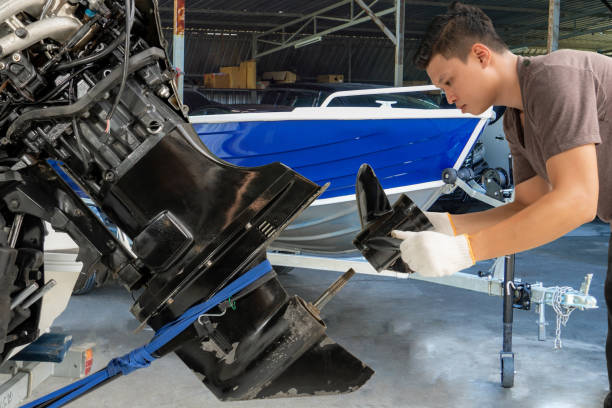Owning a boat brings endless opportunities for adventure and relaxation on the water. However, maintaining its appearance can be daunting, especially when faced with common boat detailing issues. In this comprehensive guide, we’ll explore boat owners’ challenges during detailing and provide practical solutions to ensure your vessel remains pristine, allowing you to enjoy boating without stress.
Understanding Boat Detailing Challenges:
Environmental factors: Exposure to sun, saltwater, algae, and pollution can cause fading, oxidation, staining, and corrosion, requiring regular cleaning and maintenance.
Time-consuming process: Boat detailing involves cleaning, polishing, waxing, and protecting various surfaces, including fiberglass, gel coat, metal, and upholstery, which can be time-consuming and labor-intensive.
Access to equipment: Detailing a boat often requires specialized equipment, such as pressure washers, buffers, and marine-grade cleaners, which may only be readily available to some boat owners.
Common Boat Detailing Issues:
Gelcoat oxidation: A faded or chalky gel coat is a common issue caused by UV exposure, requiring compounding and polishing to restore its shine and luster.
Staining and discoloration: Waterline stains, rust stains, mold, and mildew growth are common problems on boats, necessitating the use of specific cleaners and techniques for removal.
Upholstery maintenance: Fabric and vinyl upholstery on boats are susceptible to mold, mildew, and UV damage, requiring regular cleaning, conditioning, and protection to prevent deterioration.
Practical Solutions for Boat Detailing:
Establish a regular maintenance routine: Develop a schedule for routine cleaning and maintenance tasks, such as washing, waxing, and inspecting for damage, to prevent issues from escalating.
Use marine-grade products: Invest in quality marine cleaners, polishes, waxes, and protectants formulated specifically for boat surfaces to ensure effective cleaning and protection.
Protect against UV damage: Apply UV protectants to exterior surfaces, including gel coat, vinyl, and rubber, to shield against sun damage and prolong the life of your boat’s finish.
Address stains promptly: Promptly address waterline, rust, and other discolorations with appropriate cleaners and techniques to prevent them from becoming permanent.
Tips for Efficient Boat Detailing:
Work in sections: Break down detailing tasks into manageable sections to avoid feeling overwhelmed and ensure thorough cleaning and attention to detail.
Use proper techniques: Follow recommended cleaning and polishing techniques for each type of surface to avoid damage and achieve optimal results.
Protect yourself and the environment: Use environmentally-friendly cleaners and practices, and wear appropriate protective gear, such as gloves and eye protection, when working with chemicals.
Consider Professional Boat Detailing:
Hiring a professional boat detailing service can provide convenience and peace of mind for boat owners who lack the time, equipment, or expertise to tackle detailing tasks themselves.
Professional detailers have the knowledge, experience, and specialized equipment to address common boat detailing issues efficiently and effectively, ensuring your boat remains in top condition.
Conclusion:
Boat detailing may present challenges, but with the right knowledge, tools, and techniques, you can overcome these obstacles and enjoy hassle-free boating. By establishing a regular maintenance routine, using quality products, and addressing issues promptly, you can keep your boat looking its best and ready for countless adventures on the water. Whether you tackle detailing tasks yourself or enlist the help of professionals, maintaining your boat’s appearance ensures years of enjoyment and satisfaction on the open seas.
